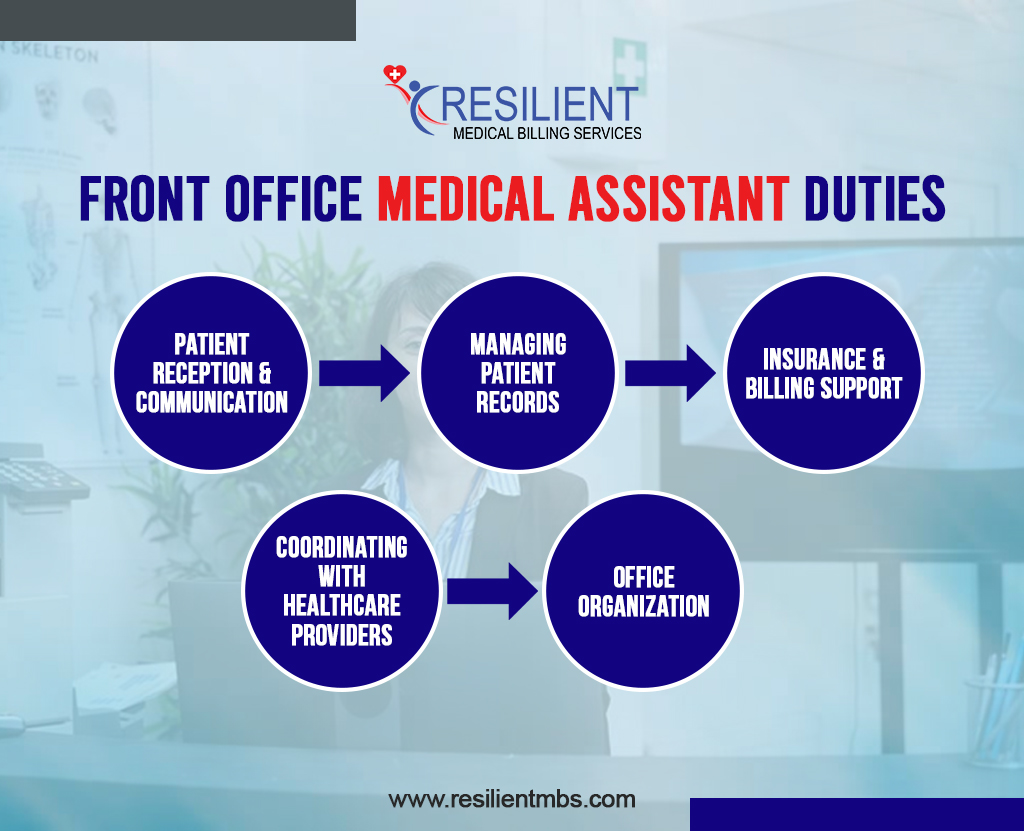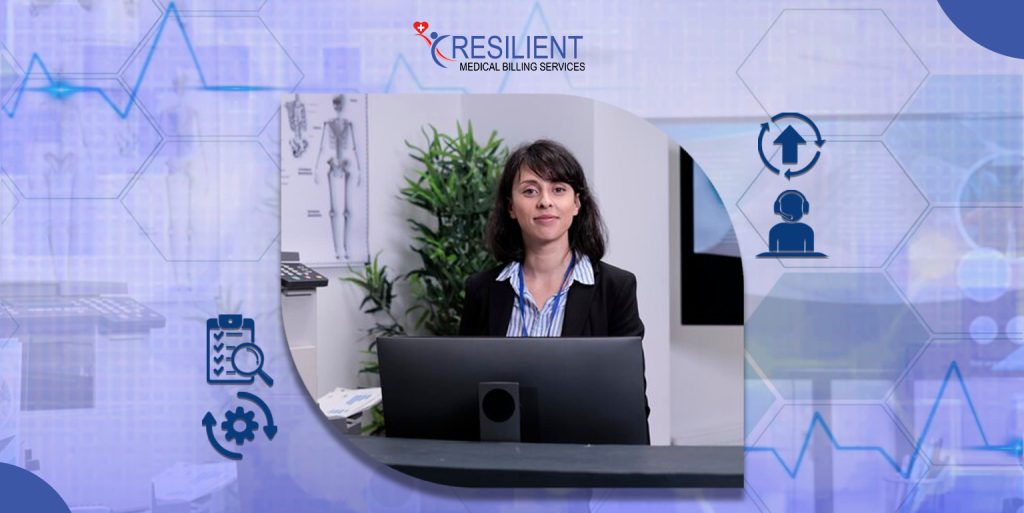Medical front office assistants play a crucial role in every clinic, hospital, or private practice. They are often the first people patients meet, whether at the reception desk or over the phone. By greeting visitors, scheduling appointments, and maintaining organized records, they help the office run smoothly and ensure patients feel welcome. Their mix of friendliness and efficiency makes them a key part of the healthcare team.
This brings us to the core question many people ask: What does a medical office assistant do, and how do they contribute to the daily operations of a healthcare facility? In this blog, we will go through all these questions in detail. Let’s dive in.
Who is a Medical office assistant?
Medical Assistant Description
A medical office assistant is someone who helps a doctor’s office, clinic, or hospital run smoothly. They are usually the first people patients meet when they walk in or call. Their job is to greet patients, book appointments, answer phone calls, and keep patient records up to date.
What Does a Medical Office Assistant Do?
A medical front office assistant plays a crucial role in any healthcare team. They ensure the front desk runs smoothly by greeting patients, verifying insurance, maintaining up-to-date records, and scheduling appointments. Their job helps keep everything in the office organized and ensures patients have a positive experience.
It’s essential to understand that their role differs from that of clinical staff, such as nurses or medical assistants. Clinical staff focus on direct patient care, including tasks such as taking vital signs and assisting doctors during examinations. A front office assistant, on the other hand, focuses on office tasks and patient communication.
By answering phone calls, handling billing information, and assisting patients in connecting with their providers, they serve as a vital bridge between patients and the healthcare team. Their work ensures that patients not only receive the medical care they need but also feel supported and welcomed.
Front Office Medical Assistant Duties
- Patient Reception and Communication
They are the first to greet patients, schedule appointments, and answer calls. A friendly and professional approach sets a positive tone for the visit.
- Managing Patient Records
They maintain accurate and updated electronic health records (EHRs), which enable doctors to provide safe and effective care.
- Insurance and Billing Support
They collect insurance information, verify coverage, and assist with claim submissions to ensure billing is handled correctly and on time.
- Coordinating with Healthcare Providers
They convey messages, create charts, and manage schedules to keep the healthcare team organized.
- Office Organization
They keep the front desk area tidy, organize paperwork, and manage supplies to maintain a professional and welcoming environment.
Essential Skills for a Medical Front Office Assistant
- Effective Communication: Front office assistants engage in daily conversations with patients, doctors, and insurance staff. Clear and kind communication helps patients feel at ease and fosters a sense of trust.
- Staying Organized: They handle many tasks at once—like scheduling, keeping records, and helping with billing. A good organization makes sure nothing is missed and everything runs smoothly.
- Utilizing Technology: Most offices utilize medical software and electronic health records (EHRs). Being skilled with these tools helps assistants maintain accurate patient information and ensure efficient office work.
- Problem-Solving: Things don’t always go as planned. Assistants often deal with scheduling conflicts, patient concerns, or unexpected delays. Quick thinking and flexibility help keep the office on track.
- Professionalism and Empathy: These qualities are essential to healthcare practice, so it’s crucial to be respectful, caring, and professional. This builds strong patient relationships and creates a welcoming environment.
Medical Assistant vs. Front Office Medical Assistant
A medical assistant often does both administrative and clinical tasks. This can include checking in patients, managing patient records, and occasionally assisting doctors with exams or procedures.
A front office medical assistant, on the other hand, mainly focuses on the administrative and patient-facing side. They greet patients, book appointments, verify insurance, and make sure records are accurate. They typically don’t handle clinical duties, such as taking vital signs or preparing patients for exams.
Both roles are essential. Clinical medical assistants support direct patient care, while front office assistants make sure the office runs smoothly and patients have a positive experience from the moment they arrive.
Front Office Medical Assistants Training And Education
Front office medical assistants need training to handle the busy and people-focused nature of their job. Many programs are available at community colleges, vocational schools, or training centers.
Students usually study:
- Medical terms: to understand doctors and patients.
- Healthcare software: to manage electronic records and scheduling.
- Office management: to keep things running smoothly.
- Patient communication: to interact with people in a kind and professional way.
Some individuals choose to earn certifications, such as Certified Medical Administrative Assistant (CMAA) or Certified Clinical Medical Assistant (CCMA). These credentials can improve job opportunities and show professionalism.
Challenges for Front Office Medical Assistants
This role can be rewarding but also comes with challenges that require patience and flexibility:

- Handling upset or anxious patients: Staying calm, kind, and professional.
- Managing phone calls and schedules: Balancing many tasks without delays.
- Dealing with insurance changes: Checking coverage and claims carefully.
- Keeping up with healthcare rules: Following privacy laws and regulations to protect patients and the practice.
Even with these challenges, front office medical assistants are key to creating a smooth-running office and a positive
experience for every patient.
The Importance of the Front Office in Healthcare
The front office is the first point of contact for patients when they arrive at a clinic or hospital. Front office medical assistants welcome patients, answer questions, and schedule appointments as needed. The way they interact with people creates the first impression of the healthcare facility.
Their role is more than just being polite; they play a crucial part in building trust between patients and providers. When front office staff manage calls, records, and appointments correctly, patients feel valued and confident in their care.
At the same time, by taking care of paperwork and scheduling, they enable doctors and nurses to focus on patient care. This keeps the office running smoothly and reduces waiting times.
Medical Assistant Description vs. Front Office Role
Medical assistants can have two types of responsibilities: clinical and administrative. Clinical tasks include checking vital signs, preparing examination rooms, updating patient charts, and assisting doctors during procedures.
Front office medical assistants, however, focus on administrative and patient-facing tasks. They greet patients, verify insurance, maintain up-to-date records, and handle scheduling. While they usually don’t perform medical procedures, their work is crucial for maintaining organization and ensuring patients feel supported.
Together, clinical and front office medical assistants share the workload, making the healthcare experience easier for patients from check-in to treatment.
Career Outlook and Opportunities For Front Office Medical Assistants
Front office medical assistants have a bright career future. According to the U.S. Bureau of Labor Statistics, healthcare support jobs are growing faster than many other fields. This growth comes from an aging population, higher demand for healthcare services, and the need for skilled staff in medical offices.
They can work in many places, including:
- Hospitals
- Private clinics
- Specialty practices (like pediatrics or cardiology)
- Outpatient care centers
With additional training and experience, front office medical assistants can advance to higher positions, such as office manager, billing coordinator, or healthcare administrator. These roles offer long-term stability and opportunities for growth.
Closing Thoughts
Front office medical assistants play a vital role in healthcare by ensuring smooth operations, supporting physicians, and contributing to a positive patient experience. Their responsibilities, ranging from patient communication to record management, require a blend of organizational skills, professionalism, and empathy.
As healthcare continues to expand, the demand for skilled front office staff will only increase. Individuals considering this career path are encouraged to pursue proper training and certification to build a strong foundation for success.
For healthcare practices seeking reliable administrative support, Resilient MBS LLC offers expert solutions designed to improve efficiency, streamline patient interactions, and enhance overall operations.
Contact Resilient MBS LLC today to learn how our team can support your medical office needs.
FAQs
What does a medical office assistant do daily?
A medical office assistant helps keep a healthcare office running smoothly. They greet patients, schedule appointments, answer calls, check insurance details, and update patient records.
Is a medical office assistant the same as a receptionist?
Not quite. A receptionist mainly answers phones and welcomes visitors. A medical office assistant performs these tasks, in addition to managing patient records, processing insurance forms, and utilizing medical software.
What skills are most important for a front office medical assistant?
They require practical communication skills, strong organizational abilities, and meticulous attention to detail. They should also be familiar with using computers and medical software. Being kind and professional with patients is also very important.
Is certification required to become a medical front office assistant?
Certification is not always required, but it can help you get better job opportunities. Training programs teach valuable skills, including medical terminology, billing, and office procedures.
What career growth opportunities are available for medical assistants?
Medical assistants can advance into roles such as office manager, billing specialist, or healthcare administrator. With more training, some may move into clinical roles or other healthcare careers.









